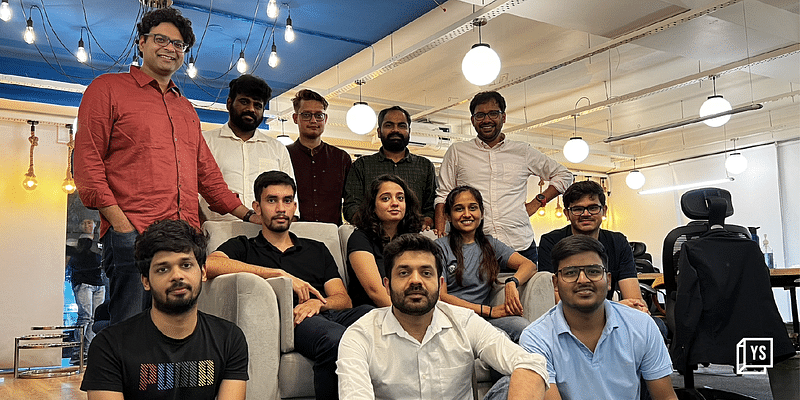Masoom Magic: Content creator, influencer, businesswoman Masoom Minawala traces 12-year journey in new book
One of India’s early influencers, Masoom Minawala recounts the hits, the misses, the highs and the lows in her book, She’ll Never Make It: My Journey from Doubt to Dominance.
Masoom Minawala was an influencer long before the term became a part of the pop culture lexicon.
Twelve years since unleashing the "Masoom Magic", Minawala (with Aditi Shah Bhimjyani) has released a book, She’ll Never Make It: My Journey from Doubt to Dominance, penning her experiences starting from being a style blogger to being at the red carpet at the Cannes Film Festival.

Masoom Minawala
In 2011, Minawala started a fashion blog, StyleFiesta on a whim, long before the advent of reels and shorts.
Today, Minawala is a content creator, influencer, entrepreneur and investor with 1.4 million followers and two businesses.
The book while tracing her journey also offers interesting glimpses and the reality behind the life of an influencer, successes, warts and all.
Minawala is frank and forthright and acknowledges the privilege she was born with, and this honesty along with stories of mistakes, self-doubt and handling curve balls make it an interesting read.
“I think what I have picked is an unconventional career, something that’s not by the book. And, the community has constantly asked me, ‘How did you start, how did you do it’. Young India today is making these unconventional choices that’s taking them off the beaten path. I thought if I could add value to one even one person through the documentation of my journey, that would be enough,” Minawala tells HerStory about the idea behind the book.
Building trust
Minawala attributes the “Masoom Magic” to the trust between her and the community that follows her, something that did not happen overnight.
“It’s been 12 years of consistently showing up,” she says. Interestingly, she’s one of the few influencers who have taken “real” to new levels.
She explains, “All our lives, we have seen role models that don’t look like us, or have lives like us, or do things that make them relatable. I have always shown a very honest portrayal of my life.”
A case in point—Minawala was ridiculed for being “short” in her Cannes red carpet pictures.
“I don’t think the world is reserved for perfection anymore. I think there is space for all kinds of people. People can relate to me because I talk of the struggles of motherhood, or when I talk of visiting my mom’s house after marriage and how it feels. These are very simple things, but they are also emotions that make you relatable to those who feel the same way,” she adds.
Race for relevance

In one of her Instagram posts, Minawala declared that the race for relevance is a dead-end one, it’s too short-term. But in an age where the entire influencer industry is judged on relevance, does she believe, after all these years, it doesn’t matter to her?
She admits that was not always the case; the thought has come only now, in her 12th year.
“I have faced every level of FOMO, imposter syndrome, inferiority complex and I would be totally lying if I said that I’ve been living as if I didn’t want to be relevant. I think there are so many personalities in the industry who are more relevant than I am today. But I truly believe that if this is a career I want to commit to, and want to do a good job and be authentic, I cannot be in the race for relevance,” she explains.
As an influencer, Minawala writes, it’s too easy to be swayed by internal and external feedback. So, how does she handle both the good and the bad? She is pragmatic in her approach – she reacts to both the good and the bad in the same way. Minawala dedicates many pages in the book to the kind of trolling and feedback she has received.
“Reaching that neutral point-of-view where you don’t let the bad or the good get to you and focusing on the work is one option. The other is to feel everything and accept that it’s part of your journey. Acceptance is important and it’s an ongoing process,” she elaborates.
According to Minawala, there are eight rules to ‘Getting Shit Done’ or #GSD as she calls it. It’s amusing to see, ‘fake it till you make it’ on the list. Isn’t an influencer’s life today all about faking it–faking their wealth, deceiving their followers – the flip side of becoming famous too soon? So, where does a sense of morality come from?
She points out that the industry came into regulation just a few years ago, and there is no structure currently.
“It’s only recently that ASCI (Advertising Standards Council of India) has mandated that we have to announce if it’s an ad in our posts. Slowly, we foresee laws and regulations. On a different level, audiences are smart and sharp and can see through dishonesty in content,” she says.
In the process of becoming a content creator and building a business, Minawala has run different campaigns to help small businesses. Currently, her #SupportIndianDesigners campaign is a curated campaign of Indian designers, offering their collection between Rs 5,000-25,000. Is giving back also an essential part of her life as an influencer?
Minawala is real when she says no business can run on ‘I, me and myself’.
“My true purpose kicked in the day I realised it’s not all about me, what I am wearing, how I’m feeling or thinking. How can I use this platform to help others? When that switch changed from me to you, it’s when the fire came alive,” she says.
('She’ll Never Make It' is published by Juggernaut Books)
Edited by Affirunisa Kankudti










